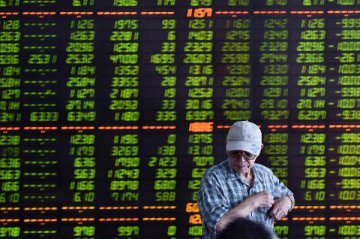
We’ve seen it before: the crazy spending, the stratospheric valuations. Twenty years later, it looks like the dot-com boom all over again, but this time the players are much bigger—and Chinese.
A Beijing-based startup that lets consumers order coffee via smartphones raced into so-called unicorn territory—a $1 billion valuation—in seven months from launch. The value of another firm, billed as an “Uber for trucks,” has soared to 300 times 2017 revenue; Uber Technologies Inc. itself is worth only about 10 times revenue.
But where some investors see dynamic exuberance, others see a market increasingly threatened by a confluence of forces including onerous domestic regulations and global trade tensions. The biggest risk? Another dot-com reckoning, the Chinese version of a cycle that erased billions of dollars of value from America’s tech sector in the 2000s and chilled tech investment for years.
There are already signs of such a shake-out as China’s publicly traded tech companies were buffeted this past week by a global tech-stock selloff and jitters from the escalating trade spat between Beijing and Washington. While the broad Shanghai Composite was down 7.6% this past week, the tech-heavy Shenzhen market lost 10.1%.
Also, Washington recently accused Beijing of tech-related spying and raised concerns about human-rights violations. Potential U.S. sanctions against Chinese tech companies could result in the disappearance of a major market for their products.
Between government pressure at home, tensions with the U.S. abroad and stock-price falls, China’s internet giants, which support a good deal of the country’s tech growth, “now somewhat suddenly find themselves between a rock and a hard place,” says Paul Triolo, a technology analyst at think tank Eurasia Group. “These problems are only going to get worse.”
For now, the boom times continue in the startup arena. Not only are China’s 109 unicorns worth more than the 127 U.S. billion-dollar-plus startups—$535 billion in total compared with $478 billion—but they also became unicorns considerably faster than their U.S. peers, data from Dow Jones VentureSource shows.
Sequoia Capital, among Silicon Valley’s most prestigious venture-capital firms, may for the first time invest the bulk of its newest global fund, up to 60%, in China, people familiar with the fund say. That fund is expected to be $8 billion, Sequoia’s biggest ever.
For the first time, Chinese startups are getting more money than their U.S. counterparts—$71 billion versus $70 billion so far this year, VentureSource data shows. The pace, with investment volume 18 times what it was five years ago, hasn’t been seen since the 2000 tech-stock bubble, feeding the perception that China is on its way to overtake Silicon Valley as the world’s tech hub.
More venture investment is flowing to startups in China than the U.S., thanks to a surge of money from U.S. investors.
†To determine where the investment came from, the Journal looked at the headquarters of the company or companies that led each round. When no lead investor was found, the Journal assigned the lead to the country whose investors made up the majority of those participating in the round.
But the threats to Chinese tech dominance are mounting as Beijing has grown wary of the clout of private tech firms and many of the biggest players burn through cash in punishing price wars with hardly a hint of when they might become profitable.
Outlays on discounts to gain market share can pay off big in a market as large as China’s. But there can be a hangover even for winners: Consumers treated to freebies tend to peel away when subsidies end.
There could be global reverberations as around 45% of the investment in Chinese startups this year came from outside China. Some investors have already gotten burned.
For a glimpse of the potential pain, consider Chinese bike-share companies. Only last year, they couldn’t spend fast enough. After putting millions of cycles in Beijing, Shanghai and other cities, several looked to conquer metropolitan areas in the U.S. and Europe.
Now, cash-flow problems are setting in. Mobike recently sold itself for nearly $1 billion less than it was valued after its last funding round, people familiar with the matter say. Ofo is reversing course on its international expansion and the No. 3 bike-sharing company, Bluegogo, collapsed late last year.
Another wild card is the regulatory environment in Beijing. The advances of Chinese tech giants were long a point of a national pride. And while China’s leaders still encourage innovation, they have tightened the grip on many of the country’s biggest players, including Tencent Holdings Ltd. and Alibaba Group Holding Ltd. —even shutting down or blocking products they don’t like.
In June, China’s official People’s Daily newspaper warned investors against a rush of capital into tech startups that could turn investing into a “gamble.” Smartphone maker Xiaomi Corp. had to scale back ambitious listing plans, eventually going public in July at a valuation of $54 billion, about half of what it initially hoped.
Still, money keeps flowing in. In September, Chinese investment firm Hillhouse Capital Group unveiled a new $10.6 billion fund—the largest-ever capital raise by a private-equity firm in Asia, topping a $9.3 billion fund set up by KKR & Co. last year. The fund was “heavily oversubscribed,” it said.
Source: The Wall Street Journal
Translated by Coral Zhong





















Latest comments